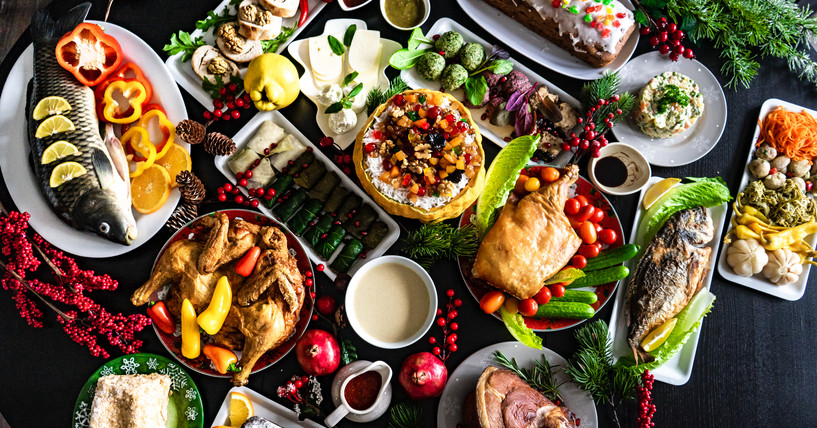Satisfying strategies to adopt during a festive eating season.

Many people wait until January 1 to start eating healthier. After all, the holidays are full of stress and extra helpings of tasty holiday foods, so why bother?
But banish that negative thought, because this is an ideal time to adopt new habits. “Diet changes you make now can help you manage stress and avoid overindulging in holiday food,” says Teresa Fung, a registered dietitian at the Harvard TH Chan School of Public Health. “Plus, by practicing healthier eating, you can start the new year with drive and motivation.”
4 Keys to Healthy Eating Patterns During the Holidays
Fung suggests four great strategies for healthier eating that can jumpstart a healthy 2023.
Focus on portion control and mindful eating. People often overeat during the holidays due to tempting food options and larger portions; think family dinners and party spreads. “This is a wonderful opportunity to practice portion control,” says Fung. For example, if there are three different cakes offered at the party and you like all three, have a small slice of each. “This way, you can enjoy a variety of treats without going overboard,” says Fung.
Eating at large gatherings is also an opportunity to practice mindful eating, which can reduce overeating. “Focus on eating slowly and savoring the flavors, and take a break to talk and socialize,” says Fung. “The slower pace gives your body time to feel what you’ve eaten and signals to your brain that you’re full, so you’re less likely to reach for a second or third serving.”
Push plants. When considering your holiday dishes, make plant-based foods a high priority. For example, the Mediterranean and MIND diets emphasize the consumption of fruits, vegetables, and whole grains, and the use of healthy oils. These diets are rich in fiber, vitamins, and minerals that help lower blood pressure and maintain a healthy weight (both welcome holiday gifts).
“The holidays are an ideal opportunity to begin the transition to a plant-based diet, since you cook more than usual and often need new meal ideas,” says Fung. Here are some ways you can start to adopt plant-based habits.
Eat more salads. These are great for parties and family meals as you can make large quantities. “Another approach is to add a salad to at least one daily meal,” says Fung.
Adopt a vegetarian day. Once a week, go vegetarian for the whole day and eat nothing but fruits, vegetables, and whole grains. “This can help you recognize the types and amounts of food you need to eat without the overwhelming pressure to do it all the time,” says Fung. As he gets more comfortable, try two days a week. A fun option is to consider specific meals or foods for certain days of the week, like Whole Grain Wednesdays and Stir-Fry Fridays.
Try new recipes. Creating just one new vegetarian meal per week can help make meal prep less overwhelming. “There are lots of easy and healthy recipes on the internet,” says Fung. “Find something that uses ingredients you like and requires only a few steps or minimal cooking skills.”
Get spicy. With all the extra baking and cooking, the holidays are the perfect time to add more spice to your diet. Many spices contain antioxidants, flavonoids, and other beneficial compounds that are involved in mood regulation and inflammation.
“There are many spice blends available that combine a variety of spices and can be used in everything from poultry to soups to garnishes,” says Fung. Better yet, experiment by creating your own blend of spices. “You don’t have to know what you’re doing, just try it out and enjoy your creation,” says Fung.
Go light on the alcohol. One survey found that the average adult consumes three alcoholic drinks a day while on vacation. And a new study suggests that just one drink a day can increase a person’s risk of cardiovascular disease. Then there are the additional calories to consider. Depending on the type of drink (beer, wine, spirits) and the amount, the calories per serving can range from 120 to over 200.
If you enjoy raising a glass of celebratory cheer, Fung suggests switching to sparkling water or a cocktail made with one-third fruit juice and two-thirds sparkling water after one or two drinks. “This can help prevent you from drinking too much and help you realize that you can enjoy social settings without alcohol even after the holidays are over,” she says.
Source: news.google.com